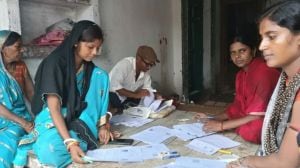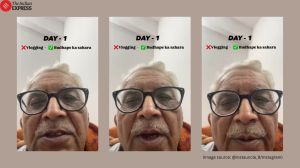India, a House divided
The ruling elite occupy the best land in the country at subsidised rates. None of them pays market rent claiming their salaries are such t...

The ruling elite occupy the best land in the country at subsidised rates. None of them pays market rent claiming their salaries are such that they cannot afford it. The rich, of course, have their resources. Where do the masses go? 8212; V P Singh
MUMBAI, DEC 22: 8220;With the urbanisation increasing, there will be a rise in the problems of the urban poor. The need of the hour is a national housing policy, a draft of which is lying with the Centre. Why doesn8217;t the Centre make the draft public, have a debate on it and adopt it?8221; former prime minister V.P. Singh told The Indian Express on the eve of another gathering of evicted slum-dwellers.
The Nivara Hakk Suraksha Samiti NHSS has organised a meeting of slum-dwellers at Shivaji Park on Saturday, which will be addressed by actress-activist and Member of Parliament Shabana Azmi along with Singh.
It is exactly seven months since Singh addressed a similar group of slum-dwellers in the Sanjay Gandhi National Park SGNP, supporting them in their demand for housing following the Bombay High Court-sanctioned demolitions. Little has changed since. Of the 33,000 slum-dwellers eligible for alternative housing, around 12,000 have paid the deposit of Rs 7,000 on the court8217;s directions. The state government is sitting on funds to the tune of Rs 15 crore, but there has been no progress in the rehabilitation process.
On the contrary, the state government withdrew its Government Resolution promising alternative sites during the just concluded winter session of the Legislature since the resolution had excluded slums on public amenities. 8220;There are two things to focus on at the meeting; one, of course, is the government legislation that the Chief Minister has promised. The second is the fact that there has to be a national housing policy in the country,8221; he said. 8220;The ruling elite, which includes the politicians, the MPs, bureaucrats and judges have occupied the best of lands in the country at subsidised rates. None of them pay market rent claiming that their salaries are too low for them to afford such rates. The rich, of course, have their resources. But where do the masses of the country go?8221; he remarked.
Involved equally in the housing rights of slum-dwellers in Delhi, Singh said he is living in a bungalow occupying two acres in the capital, where he pays a rent of Rs 5,000. 8220;I have told the Government that slum-dwellers of a jhuggi occupying a similar area are willing to pay it a rent of Rs 10,000. Will the government accept that?8221; he asked, adding that refusing the poor their housing rights is a design of the ruling elite.
Asked why housing is so low a priority for the Government, Singh had a kind word for the state of Maharashtra. 8220;Here, the state at least has a government policy declaring that all pre-1995 slums will be protected. There is no such thing in Delhi. They have been making promises, but that is all,8221; he says. He admitted that the slum lords play a role in the proliferation of slums but he had another explanation to it. 8220;It is not necessarily vote-bank politics. Where will the people go if the state does not make provisions for their housing? They will go to the person who does that for them.8221;
He agreed that the slum lords have political patronage, leading to the economic exploitation of the poor. 8220;So there are laws, who is stopping the law from taking action against them? There is a lack of political will both in this case, as well as in making a housing policy for the poor,8221; Singh said.
In the end, he added, the struggle will have to be undertaken by the poor themselves. Despite the painful dialysis he undertakes every alternate day to fight his blood cancer, the zeal of the Raja of Manda he has given up his farmlands for local housing to pursue this issue has not dimmed. He is, however, satisfied that there is a greater response to housing demands now. 8220;At least today chief ministers agree to make laws, that is a dramatic change I have witnessed,8221; he said.
- 01
- 02
- 03
- 04
- 05






























